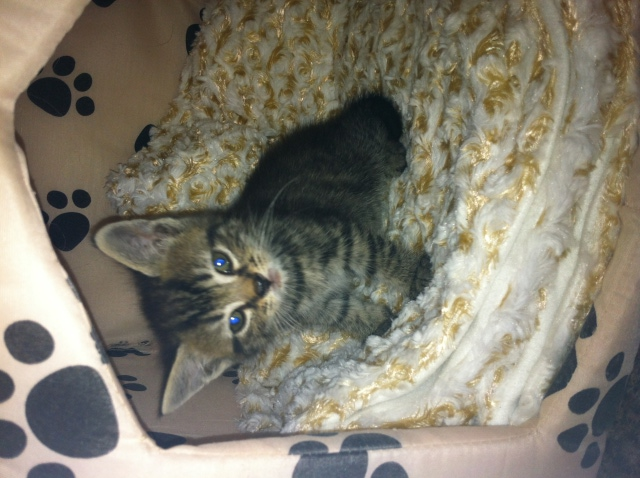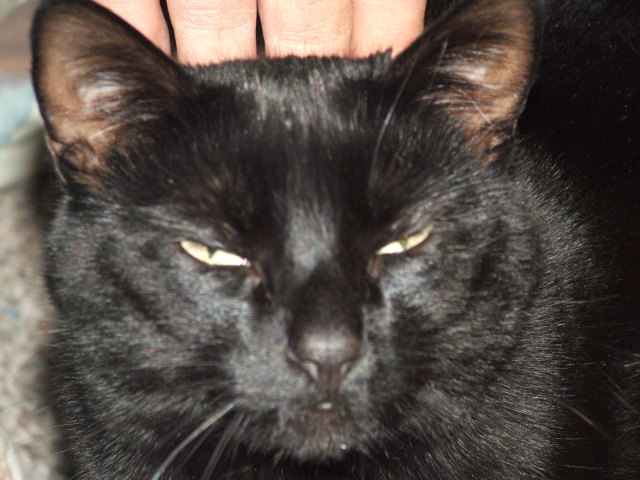Questioni recently caught a kitten that was living behind my work. the vet said she is 8 weeks old and ive known about her living on the property for at least 4 weeks. ive brought her home and am wondering how i can make her less skidish. she will not come to me and when i let her run around she finds the closest hiding spot to burrow into. i try to hold and play with her for increments and the let her alone in her makeshift box home to help her be comfy. any suggestions?
AnswerKaylee,
Based on the information that you've provided it really sounds like your newly adopted a kitten that is coming from at least one if not a combination of situations that would explain her extremely fearful reaction to being handled. Unfortunately it's not uncommon to find kittens who have been abused, abandoned, neglected or otherwise physically or psychologically hurt by cold hearted, irresponsible or outright cruel human beings. In this kitten's case there are a few things that could be causing or contributing to her extreme fear, the answer may be made up of one or more of the following options:
1) She may have been born to an abandoned queen who is comfortable with people, but was kicked out after becoming pregnant.
2) It's possible that the kitten was born to a feral queen.
Regardless of whether mom was a stray cat or a feral cat this would mean that her babies most likely weren't handled or socialized with human beings from an early age.
3) Abuse is a possible culprit for this kitten's extreme fear. I know that it's an awful possibility to contemplate, but unfortunately there's a chance that your kitten has been physically abused and/or psychologically traumatized at the hands of one or more people. Sadly acts of cruelty against animals are more common than any of us would like. If your kitten was the victim of cruelty, ongoing physical abuse or she was traumatized in some way it's perfectly reasonable that she'd be a very anxious, fearful kitten who is uncomfortable with being handled. Abused cats can be rehabilitated, but be forewarned that it's not an overnight project, you'll need to be patient, take your time and make conscious efforts to send this baby positive images and feelings.
4) It's quite possible that this kitten was abandoned by a cruel person who simply didn't want to take responsibility for his/her unspayed cat's offspring. If your kitten was abandoned it's possible that the only human contact this kitten and her siblings experienced was when they were abandoned where you found your kitten. If your kitten was abandoned with siblings it's quite possible that she's the only survivor from her litter, this would certainly be quite a traumatic experience for such a young little being.
5) This kitten could be the victim of serious neglect. It's quite possible that your kitten was never properly socialized, she may never have experienced the touch of gentle human hands until you came along. Unfortunately there are many people in this world that treat strays of all descriptions badly because they don't want to have them around their property.
At this point it really doesn't matter what specifically is causing your kitten's extreme fear, the bottom line is the same for each issue. At this point it sounds to me like your kitten is anxious, extremely uncomfortable with being handled and quite possibly the largest obstacle you and your kitten will have to overcome together is that she doesn't sound like she trusts any human being. I've provided you with all of the bad news by offering possible theories for what could be happening with your baby girl, the good news is that it's possible to rehabilitate this kitten and make her substantially more comfortable with you (and as time passes friends, family members, etc). I'm not going to lie to you, rehabilitating a cat with such serious issues will be a long, difficult, emotionally draining process that will require time, patience, loads of love, a calm, quiet atmosphere and once your kitten isn't afraid anymore and she's started to trust you tyou can speed the rehabilitation process up by using special food rewards to reward/bribe your kitten. In my experience the best food rewards for most cats include:
- tuna
- sardines
- salmon
- cheddar or parmesan cheese,(or any other kind your kitten shows an interest in)*
- plain or vanilla yogurt*
- meat/broth baby foods (lamb, chicken or turkey tend to be most popular)
- homemade meat/broth puree using any kind of meat your kitten enjoys
* Most cats are lactose intolerant by the time they're 3 months old and the majority of dairy products can cause digestive upsets such a vomiting or diarrea if your kitten is lactose intolerant. Cheese and yogurt are the exceptions to that rule, they contain beneficial bacteria normally found within the digestive tract in humans, dogs, cats and other mammals. It's okay to give your cat cheese, but do try to bear in mind that cheese can cause constipation in large amounts and that wouldn't be comfortable for your kitten.
Regardless of the cause for her high levels of anxiety and fear my recommendations for each situation are fairly similar. Rather than allowing an anxious, fearful and somewhat overwhelmed kitten roam your entire house it's best to start off with baby steps. The first thing that I'd recommend is setting this kitty up in a room of her own such as a bedroom or large bathroom, this will help to reduce her stress level and make her feel more secure. A seriously fearful kitty like this can actually become more stressed out if s/he's left to figure every part of a new environment out at once, providing your kitten with a safe room will help her to relax a bit since she can explore her surroundings and become familiar with them fairly quickly. Within any household there's plenty of stimulation just with regular daily tasks that happen in each room, at this point all of the unfamiliar sights, sounds, smells and movement of people within the household may be too overwhelming for her to deal with at the moment.
The idea of providing your kitten with somewhere to hide is spot on, make sure her cardboard house is in her new living quarters so that she can feel as safe as possible. Since this kitten is so anxious I would strongly suggest that you minimize attempts to handle her that involve chasing her around, pulling her out of hiding places or catching her as she runs past. She's just not ready for that kind of stimulation right now. If at all possible try getting your kitten into her temporary safe room without handling her. If there's no way to avoid handling your kitten in order to get her into her temporary living quarters I'd suggest that you avoid making direct eye contact with the kitten, approach her sideways and crouch down to make yourself as small as possible to minimize the risk of your baby girl feeling threatened. It's not a bad idea to use a heavy bath towel to simply cover the kitten and gently lift her up while allowing her to remain hidden, this approach serves two main purposes, first and foremost covering a cat's eyes when s/he's frightened helps to calm him/her and secondly if you gently wrap the towel under the kitten she'll have a harder time biting or scratching you out of fear. In the event that you do need to move the kitten by carrying her from place to place keep your mindset positive and calm, make sure that you hold the kitten close to your body and firmly against your chest, this will reassure the kitten that you aren't going to drop her which will reduce the risk that she'll panic because she's not feeling secure and hurt you or herself. My recommendation would be to set the safe room up with all of the essentials before moving your kitten into her new accomodations, that way you won't be moving around getting things set up once she's in her new room and potentially causing more anxiety for her. This kitten's safe room should have a cozy place to sleep, small toy mice, 2 kitten sized litter boxes, her cardboard house, a bowl of fresh water and food (depending on whether you're feeding canned/dry food, commercially produced or a well balanced raw homemade diet you may have to feed the kitten a meal every 3-4 hours).
I know that it can be difficult when you're working with a kitten in such rough shape psychologically, but it's best if you can try to put a positive spin on things and avoid feeling sorry for the kitten. I've found that the best approach to help a cat or kitten who is anxious, fearful and unable to trust people is to start off slowly. In your kitten's case it's best to assume that she's never known the touch of loving human hands. Animals don't understand pity or sympathy, all they see is that you're having negative feelings which can cause them more anxiety which can slow or even stall the rehabilitation process. I'd strongly suggest that you approach each step in the rehabilitation process by visualizing a postive outcome, cats seem to pick up on the things we visualize in my experience, in your kitten's case you could try imagining her happy, healthy, confident and seeking out your attention or purring in your lap. I'd be lying if I told you that your kitten will completely forget her past experiences with people, but I'm sure that she'll actually be able to change dramatically for the better if you take your time with her. If you keep things positive you and your newly rescued kitten can build a strong bond built on mutual love, trust and respect.
At roughly 4 weeks of age, when you first spotted this kitten she really should have been with her mom, by that point, in the majority of cases queens that are allowed to raise their kittens naturally will begin introducing small amounts of solids to their kittens' diets at this point while still allowing them to nurse on demand frequently for as long as they need to. Contrary to popular belief provided that a queen is in good physical shape and she's been receiving adequate amounts of a high quality diet there is no reason to step in and wean her babies for her, she'll do it on her own most likely within the first 7-10 weeks of life. When kittens are weaned too early there can be serious lifelong psychological and physical consequences.
For the most part moms know when their babies are ready to be weaned and over the space of 1-2 weeks queens will gradually start reducing the length of time that they'll stay still for their babies to nurse and many moms will begin refusing to allow their kittens to nurse as frequently - at that point you'll often see them pushing their kittens away whenever they try to nurse. Some kittens get the message quite quickly and they'll begin to eat more solid foods, other kittens take extra time, but by the time kittens are 10-12 weeks old they're usually weaned. Although kittens can be separated from their mother at 5-9 weeks old it's not something I recommend, I've found that kittens who are prematurely taken from their littermates and mother tend to develop issues with anxiety, inappropriate use of their claws and teeth or self soothing behaviors like sucking blankets, finger tips, the fur of other pets in your home, stuffed animals, clothing, ear lobes, human hair and many other objects. On average kittens taken from mom and their siblings before or immediately after being weaned tend to have more behavioral issues. It's important to remember that queens and littermates provide valuable learning opportunities for kittens. Mom teaches her kittens how to become well adjusted, happy cats. In the first 10-12 weeks of a kitten's life s/he learns how to be a cat, this means that babies learn behaviors including stalking, pouncing and killing prey, how to defend themselves, how to perform basic tasks like using the litter box, eating solid food, scent marking with the scent glands in their face and paws, how to recognize and react appropriately to feline body language and mom also sets limits for her babies, they learn fairly quickly that inappropriate use of claws and teeth results in immediate disciplinary action by mom. I've always noticed that the queens who make the best moms for their babies also teach their offspring the household rules that apply within their household, in situations like this all we need to do as caregivers is to continue on with the parenting where mom left off by providing consistent, humane and appropriate consequences for inappropriate behaviors such as ambush attacks of human body parts, biting or scratching people or exercising claws/teeth on inappropriate surfaces.
I've found that when a cat has been abused and unable to trust people easily there are a few basic things you need to know - there's no deadline, you'll need to keep things calm and somewhat neutral in the beginning, as the kitten recovers you can allow yourself to pass along love and calm energy. A truly fearful cat won't eat or accept bribes in the form of special treats in your presence. Once you've accomplished small milestones then you can gradually increase the intensity of the exercises until you've got the kitten to trust you regardless of any loud noises, new people and different things that aren't a part of daily life. It's important to keep things as relaxed as possible, once the kitten trusts you then you can move onto using food rewards, play sessions, etc to reward positive behaviors like curiousity, playing, seeking out attention, interacting with you by making eye contact or meowing at you, etc.(rehabilitating victims of cruelty takes time, patience, love and bribery in the form of irresistable treats in my experience).
After getting your kitten settled in her safe room you'll need to begin the process of rehabilitating your baby. It's not a bad idea to consider seeking the advice and guidance of a holistic vet who uses homeopathy within his/her practice. There is a homeopathic vet who answers questions in the Ask a Vet category of this website, her name is Dr. Christine Chambreau, if you have any in depth questions I'm sure she'd be happy to help. As far as I know Dr. Chambreau does telephone and internet consultations online or by telephone anywhere in the US, so that's an option if you're interested. I'd strongly suggest that you consider trying out a couple of homeopathic remedies, they're called Bach Flower Essences and I've found them to be safe, effective and gentle ways to treat anxious, abused, fearful or traumatized cats. Homeopathy works on the principal that like cures like, if you'd like to learn more about homeopathy, there's quite a bit of information about the history of homeopathy online. A general remedy that works well with fearful, anxious or traumatized cats is Bach's Rescue Remedy, this is a blend of several different remedies and in a pinch it works wonders. The specific remedies that I'd recommend for your kitten's rehabilitation are Rock Rose for trauma, Mimulus for specific fear and Elm to promote optimism. I'd suggest that you add 7-10 drops of each remedy to your kitten's fresh bowl of water each morning. You may be surprised at the changes your kitten begins to show within a relatively short period of time. Once your baby is comfortable with being handled you can actually rub a drop or two of the remedies onto her ear flap and gently massage the ear until it's dry. You can usually find Bach Flower Remedies at health food stores, some mainstream pharmacies sell them in their vitamin/nutritional supplement aisle and I believe that you can buy them online as well. The beauty of using homeopathic remedies to treat a kitten like yours is the fact that they allow the body, mind and spirit to slowly return to balance and unlike traditional allopathic medicine homeopathic remedies won't cause adverse reactions, the worst thing that will happen if you give your kitten the wrong remedy is absolutely nothing.
To start off working to rehabilitate your fearful feline rehabilitation is really quite simple, you'll need to spend as much time as possible in the kitten's safe room doing crossword puzzles, reading books and generally pretending that the kitten doesn't exist. This allows the kitten to relax, she'll realize that you aren't going to force her to do anything she's not ready to do. When you go into the room with your kitten to spend quiet time with her you can actually bring in a plate of bribe treats and place it somewhere in the room that's fairly close to your kitten, but not close enough to increase her anxiety levels and send her into hiding. Gradually since you aren't acting like a terrible, dangerous being your kitten's curiousity will start to get the better of her, she'll actually start coming out of hiding on her own. When she does I want you to do something that I'm sure will be difficult, pretend you haven't seen her and resist the urge to clap, shout and jump for joy. Over time this kitten will begin to inch her way closer to you and start investigating you by smelling you. Again it's important to keep things calm so that she doesn't get spooked and run back into hiding. In many cases the kitty will eventually come and push her way under your hand looking for attention, but this will take some time. If you have any questions, concerns or you'd like me to clarify anything within this answer please don't hesitate to contact me again.

 Bengal kitten?
Question
Pic Picture
Hello, I was wonderi
Bengal kitten?
Question
Pic Picture
Hello, I was wonderi
 Persian Male peeing outside of litter box
Question
Bambam
I have a 2 year old Male persian who ur
Persian Male peeing outside of litter box
Question
Bambam
I have a 2 year old Male persian who ur
 Cats not feeling well/sneezing a lot
QuestionFurry Children
QUESTION: I have 3 fixed
Cats not feeling well/sneezing a lot
QuestionFurry Children
QUESTION: I have 3 fixed
 Kitten not eating
Question
Tiny
I have a 10 week old female kitten
Kitten not eating
Question
Tiny
I have a 10 week old female kitten
 Siamese tracks feces around the house
Question
Dirty Foot
I recently adopted a wonderf
Siamese tracks feces around the house
Question
Dirty Foot
I recently adopted a wonderf